
by Steve | May 22, 2017 | Magazine, Magazine Articles, May-June 2017

Photo courtesy of Compassion International.
By Shannon Vowell-
Did you know that Methodism has been in India for a long time? I didn’t. For me – for many – the Methodist Church and the country of India intersect only in the work of the illustrious E. Stanley Jones, 20th century Methodist missionary giant and friend of Gandhi. But Jones’s seminal work, Christ of the Indian Road, was written 69 years after the first emissaries from the Methodist Episcopal Church in America arrived in the then-state of Oudh.
Not only has Methodism been in India 161 years, Methodism maintains a prominent place in the Indian pantheon of faiths. The autonomous Methodist Church of India has 12 regional conferences under 6 Episcopal areas. Total membership for the MCI and the Churches of North and South India (members of the World Methodist Council) approaches 5,648,000. (To put that in perspective, total membership for the UMC in the U.S. in 2015 was 7,067,162.)
This historic and ongoing connection is one of several compelling reasons why United Methodists should take note of recent events in India. What has happened to Christian ministries there matters to us, because we share with them the purpose of “making disciples of Jesus Christ for the transformation of the world.” Further, what happens next may depend on us, because ever-fewer disciple-makers remain in place.

Photo courtesy of Compassion International.
On March 15, 2017, Compassion International – the Christian global ministry giant specializing in serving vulnerable children– ended 50 years of Indian ministry. Nearly 150,000 children who had had access to food, clean water, medical care, education, and the encouragement of foreign sponsors and local community centers, lost access to all of the above in the space of a day.
Why? Well, we’ll start with the politically correct, official, version of what happened.
American politicians bemoaned a mysterious inability on the part of Compassion and the Indian government to identify and agree on a mutually acceptable compromise regarding regulation and tariff laws. Legal representatives for Compassion pointed to egregious misapplication of Indian laws on the part of the Indian government.
In reality, Compassion is the largest of hundreds of charitable (mostly Christian) non-government organizations (NGOs) being systematically ousted from India, because the prevailing worldview of the most recently elected regime there has influenced the way the law is applied. The issue is not whether Compassion violated or failed to compromise on some obscure regulatory code embedded in Indian tax law. Nor is it that the Indian government misinterpreted its own laws for financial gain. Rather, the issue is that a Hindu Nationalist regime cannot be true to its own principles while accommodating foreign operatives who have overtly Christian motives.
Stating these truths – politically incorrect as they are – has to be our first step in identifying what challenges may lie ahead for Methodist brothers and sisters who remain in place in India.
Next steps include cultivating a basic understanding of the ways Hinduism and Christianity are mutually exclusive. For example, the caste system. Officially extinct but actually in full force and effect, especially in rural areas among the poorest poor, this system categorizes Indian citizens into spiritual social tiers, between which there is no movement. The tiers and one’s place in them, are fixed and connected to the Hindu doctrine of karma. Karma explains a person’s life station and suffering as part of the cycle of existence; repeated reincarnations allow a human soul to make reparations for past sins in past lives. Progress can occur with each rebirth of the soul, as good works accrue and past sins are expiated. This progress leads the soul toward transcendence – moksha.
For a Hindu, serving the poor and marginalized can be personally expedient, because good deeds build good karma for oneself; this in turn accelerates progress toward moksha. But at the same time, one must not interfere with the karma of those being served. Within Hinduism, to artificially elevate someone to a different life station is to condemn them to further incarnations in which penance is required – delaying moksha and actually prolonging suffering. Politically incorrect to acknowledge, but nevertheless true: Karma provides justification for non-interference in the cycle of suffering – and karma labels indifference to the desperately poor a moral good.
By contrast, the Christian doctrine of reconciliation to God and equality in the eyes of God requires Christians to embrace and serve the poor as family, literally! Jesus gathered in the marginalized and comforted the forsaken, so Christians must do likewise. Historically, Methodists have applied this doctrine of reconciliation by founding and funding institutions whose very purpose is the interruption (and abnegation!) of the cycle of suffering: orphanages, schools, soup kitchens, hospitals, ministries of healing and help.
We United Methodists share the Indian dilemma faced by Compassion and ministries like it. Looking at a country where an estimated majority of the world’s poorest poor live, our Christian work appears urgently relevant and necessary. But the government which can give or withhold access to its needy population literally sees things differently.

Photo courtesy of Compassion International.
Hinduism protects the status quo as just and right within karma, and understands the alleviation of suffering as more harmful than the suffering itself. Christians challenge the status quo as part of the call to transform the world in Jesus’s name. Such deep contradictions in basic understandings of human worth, life purpose, and duty to fellow man must be acknowledged, no matter how politically incorrect such acknowledgement feels. To do otherwise – to “explain away” the situation in India as some petty money matter – makes a mockery of both Hindu and Christian belief systems.
The world of diplomacy often treats belief systems as side issues. But the inconvenient fact is that governments legislate based on systems of belief. These belief systems are not interchangeable. Indeed, they are often mutually exclusive.
Rather than capitulate to the stalemate of the world’s status quo, Christians must stand firm on the faith that puts the world in its proper perspective. We serve a God who is neither constrained nor confused by the idiocies of political correctness!
John Wesley’s example of persistent, faithfully offensive shrugging off of the world’s expectations of him surely makes Methodists uniquely qualified to handle situations like the one in India. And E. Stanley Jones’s testimony to the cross-cultural power of Wesleyan witness within the specific context of India surely applies all the more urgently today. Perhaps it is within the unique, Methodist application of the gospel that we may find the way forward for ministry in India (or anywhere the gospel is officially rejected)?
As Wesley taught us, we are to be people of One Book and servants of One Master. Because the children of India are children, and because they are suffering, and because we are Christians, we must be moved to compassion. “Little children, let us love, not in word or speech, but in truth and action” (1 John 3:18).
Following the example of Christ, who admonished his disciples when they prevented the children from drawing near to Him, we must find ways to serve the poor children of India. We must look beyond the shrugged shoulders of worldly governments and rely on the One on whom rests all the authority of the cosmos. “… our citizenship is in heaven, and it is from there that we are expecting a Savior, the Lord Jesus Christ” (Philippians 3:20).
For our part, United Methodists should pray that Christian and other non-profit humanitarian organizations would be permitted to resume their work in India. We should also pray that a new generation of Hindi-speaking Christians be granted wisdom in order to reach India with the love of Jesus. Lastly, we should pray that the hearts and minds of the government officials working with Prime Minister Narendra Modi would be softened and changed.
Perhaps the words of Jesus himself define the terms of our obligation most clearly: “Take care that you do not despise one of these little ones; for, I tell you, in heaven their angels continually see the face of my Father in heaven” (Matthew 18:10).
Politically incorrect and discomfiting as it may be, United Methodists cannot allow governments to dictate which children may be loved. Compassion, the organization, has been jettisoned from India for one reason: because they served the poor in Jesus’s name. Compassion, the core characteristic of Jesus, cannot be redefined in order to justify or explain away that historical fact.
Shannon Vowell writes and teaches on loving Christ and making disciples.

by Steve | May 22, 2017 | Magazine, Magazine Articles, May-June 2017
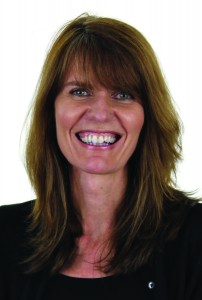
Ruth Burgner
By Ruth Burgner-
Those of us in the missionary community get to hear stories of extraordinary fruitfulness. For example, a TMS Global missionary family serving for the past 16 years in Peru recently reported that more than 8,200 people in 13 states in Peru are being discipled. This all started in 2006 with only three small groups meeting in this family’s house.
But as you know, in ministry there are other smaller, quieter happenings. These might go untold because they might seem to us too unremarkable or too unfinished to seem worthy to mention. They might be the planting parts, not the harvesting parts. They might be the details of the times when nothing, or only the most miniscule thing, appears to be happening. I sometimes wonder if missionaries – and all of us – hesitate to tell those bits. After all, says author and spiritual director Mark Yaconelli (Nomad, podcast 114), most people don’t tell our story until there is a happy ending. Is it okay to testify about the middle parts, even before we know how it all turns out, even before everything seems resolved?
Recently, I heard the telling of a “middle part.” One of our missionaries, Sue Fuller, who has served for the last 22 years among orphans in the Russian Far East, recalled events of a particular week. She and her-then roommate, Ari (who now serves on the home office staff), had enjoyed a day with the girls of the orphanage. They decided they would also plan a fun event for the boys. Planning for boys, though, seemed less intuitive. So they did what they knew to do. They planned food (always a winner) and karaoke (which is apparently big in Russia). The event all went well enough, although pretty low-frills in their eyes. They just hoped the orphan boys felt loved and had a good time.
But then days later, Sue overheard one of the boys talking about it to a friend. He told details about every single thing he ate and every song they played. And then this young orphan boy told his friend, “It was the best day of my whole life.”
From this account, we don’t know what happens next in the life of this young orphan, for whom one karaoke-and-snacks event was his all-time highlight. Even so, the graces in this story stand out like the colors of a sunrise. I love that Sue took note of them.
Pay attention to the graces; hunt for them, our TMS President Max Wilkins told the audience of a recent event. “Heaven and earth are full of the glory of God. …We train our missionaries to go as ‘glory sighters.’” And our missionaries are some of the best “glory sighters” I know. Eagerly, they spy out the signs of God’s activity, even in the seemingly bleakest settings.
For example, Kathleen,* a TMS Global missionary and nurse, was working in a hospital in one of the most difficult areas in Southeast Asia. When she was asked why she stayed, here is how she answered: “Why do I stay in this sweltering, filthy, difficult place? It’s not as hard a question to answer as some might think. Jesus is here in this place. I see Him all around me. I see Him in the gentle touch of the nursery staff as they attempt to care for too-small, too-weak infants who are often lying three to a crib. I see Him in the sorrow on a father’s face as he sits at the bedside of his child slowly squeezing an ambu bag because there are no more ventilators available. I feel Him with every new experience, every new story, one more baby who won’t die in a sack in a drainage ditch, one more daughter-in-law who won’t be beaten to death, one more child who won’t be sold into slavery, one more family laughing, dancing, and rejoicing in their new-found hope in a Savior called Jesus. This is a place surrounded by hardship, discouragement, struggle, and frustration. This is the Garden of Gethsemane. Jesus is sweating great drops of blood here, and I want to be with Him.”
You and I might not often see like Kathleen and Sue. It’s easy to view the world through lenses of dull gray. After all, notes Eugene Peterson, “We do not live in a world that promotes or encourages wonder.” And yet into this world the kingdom of God has come. The crucified Christ is risen. The whole earth is full of His glory. Like these missionaries, we can learn to see with new eyes. We can develop a disposition of awe. We can learn to “rejoice in the Lord always” (Philippians 4:4). “We have to cultivate responses of awed reverence,” says Peterson, “or risk missing the very heart of what is going on.”
Ruth A. Burgner is the senior director of communications for TMS Global – www.tmsglobal.org. *A pseudonym.

by Steve | Mar 20, 2017 | Magazine, Magazine Articles, March-April 2017

Rev. Rob Renfroe
By Rob Renfroe-
Facing reality can be painful. Especially when the only choices reality offers us are difficult, unsatisfying, or confusing. At that point there is a tendency to walk away from the problem emotionally and mentally in one of two ways. There’s the Scarlett O’Hara approach: “I can’t think about that right now. If I do, I’ll go crazy. I’ll think about that tomorrow.” Or we tell ourselves everything is going to be ok and make up some reason why we don’t have to act. In other words, we create a comforting myth that helps us sleep at night but that actually does nothing to resolve the issue. Either way, we deny reality and usually end up with a solution far worse than what might have been.
I’m afraid many United Methodists are still denying the reality of how deep our divisions run and how difficult a workable solution to our problems will be. I believe this because of the myths I hear people, many well-intended, clinging to and trying to persuade others to believe.
One long-standing progressive myth, recently restated by a retired bishop, is so obviously false that it’s hard to imagine anyone still holding on to it. It’s the idea that our differences over sexuality can be resolved through “the local option” – that is, allowing individual pastors to determine whether to marry same-gendered couples and permitting each Annual Conference to decide whether to ordain practicing gay persons.
Only persons who have been asleep longer than Rip Van Winkle was could find any solace in this illusion. More benign compromises failed to gain General Conference approval in the past decade. And more recently in Portland last May, after several of our leading pastors and our most influential administrative body, the Connectional Table, used all of their influence to promote such a plan, it was so soundly defeated in committee that it was not even brought to the plenary floor. The local option is dead. I pray that the Bishops’ Commission on A Way Forward will not waste precious time following our own Alices in Wonderland down that rabbit hole.
A conservative myth that needs to be dispelled is “maybe the progressives will leave.” It usually begins with the statement, “If they don’t like the way the church is, they should leave and start their own.” Sorry to burst your bubble, but this is a political battle. And in politics “should” has nothing to do with what people actually do. The progressive goal is to change the whole church, not create a progressive subdivision of the church.
An amicable separation (or as some have begun to call it “a new form of unity”) may be proposed by the Bishops’ Commission, but the progressives are not going to just up and leave on their own. Why would they? They just elected as bishop a married lesbian who has stated that she has performed 50 gay weddings. In the entirety of the Western Jurisdiction, in most of the Northeastern Jurisdiction, and in much of the North Central Jurisdiction pastors may marry gay couples and break the Book of Discipline with no consequences of any kind. A dozen annual conferences are on record that they will ordain practicing gay persons regardless of church law. So, why would progressives leave when they can do what they want to do, have continued access to general church funds, and can keep the name United Methodist?
“Well, we’ll write stricter legislation at General Conference and make it even harder for them to break the rules.” We have good policies now. Our problem has never been bad legislation; it has always been bad actors. You can be sure they will be just as disobedient to stricter rules as they are to the present ones.
“Then, let’s go nuclear. Let’s make the rules so that we can vote out any pastor, bishop, or congregation that breaks church law.” I understand this approach, but I find it less than realistic. Conservatives hold the line against gay marriage and ordination by the slimmest of margins every four years. It is a misguided myth to believe that the General Conference is going to give some governing body the authority to start excommunicating pastors, churches, and bishops. That’s not who United Methodists are. We are nice people, warm-hearted and generous of spirit. General Conference will never pass a proposal for some small group to be authorized to decide who’s a good enough Methodist to stay in the church and who’s not.
“But maybe in 20 years, we can ‘win.’” Faithful United Methodists are leaving our congregations every day because of the continuing battle over sexuality. People are tired of it and they’re walking away. Two large churches in Mississippi – one the 15th largest church in the denomination – have announced they are leaving. That’s in conservative Mississippi where no one is marrying gay couples and where the bishop upholds the Book of Discipline. In the Good News office, we regularly receive calls from pastors who are under pressure by their congregations, especially in liberal areas, to lead them out of the denomination.
If the Bishops’ Commission does not resolve this issue, there will be no “twenty years from now.” People will leave. Pastors will leave. Churches will leave. Conservative people, pastors, and churches. If the Commission does not come up with a solution, the church will be in so much chaos that the slow drip, drip, drip of faithful evangelical members leaving will become a roaring flood.
As evangelicals and traditionalists, we need to do some serious thinking about what it means to “win.” Win what? A church that 20 years from now could be so depleted in numbers that “a faithful remnant” would be a generous euphemism to describe what’s left? Winning is not holding onto a church that is a shadow of what it once was and what it could have been. A win for the Kingdom is coming out of the present mess with as many faithful Methodists as possible connected to each other and working together for the Kingdom.
One final myth is that “what’s at stake is the unity of the church.” We’re way past that. One bishop recently stated to his pastors, “Twelve of our annual conferences are in schism right now. They are unwilling to live by our covenant and that places them in schism.” Twelve annual conferences. That’s over one-fifth of the conferences in the United States and there are others who do not live by the Discipline, they just haven’t stated so publicly.
We are not a united church. Having the same name on our signs and the same logo on our letterhead does not make us a unified church. The bishops had their opportunity to work for the unity of the church by teaching our doctrines and enforcing our covenant for the past 50 years. Instead, many decided to be permissive parents allowing disobedience and rebellion, and others actually promoted such behavior. And sadly, few of our conservative bishops have banded together to speak out or call the rogue bishops to task. And the result, as it is with all families headed by permissive parents, is not unity but dysfunction, self-centeredness, and division.
Over a decade ago I told a group of bishops, tasked with creating unity within the church, “You may wish you had another issue to deal with other than sexuality. But this is the issue of your time that threatens to divide the church. You will either act in a way that holds us together or you will act in a way that guarantees our division. Either way, it will be on you.” Now here we are. And to be told by some of those same bishops that the unity of the church is now at stake – well, I don’t know whether to laugh or cry.
Look, the Commission is the game. Not stricter legislation in 2020. Not a local option. Not hoping or making the progressives leave. Those are myths and nothing more. Please do not be distracted by illusions that may bring comfort the way pleasant dreams do at night but that disappear upon waking. What the Commission recommends will either be based in reality or in wishful thinking.
Let’s make sure its members hear from us that clinging to or promoting myths and illusions – progressive or conservative – will not serve the church or the cause of Christ well. Reality may not be what we wish it was but it is what is. Let’s face it honestly and courageously with our eyes wide open.
Rob Renfroe is the president and publisher of Good News.
![Methodism in Cuba, Spirit-Filled and Overflowing]()
by Steve | Mar 20, 2017 | Magazine, Magazine Articles, March-April 2017
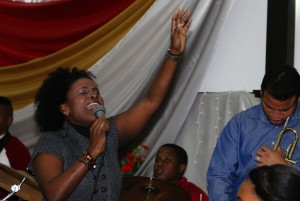
Worship leader Lauren Smith Perez singing at Central Methodist Church in Havana, Cuba. Photo by Steve Beard.
By Steve Beard-
Within a Caribbean culture marked by Cold War skullduggery, economic scarcity, and vindictive secularism, the Methodist Church in Cuba stands out as a beacon of spiritual freedom, miraculous signs and wonders, unexpected blessings, and salsa infused worship. Not only has vibrant Christianity survived some of the darkest decades of Cuba’s history, it is a thriving testimony to the profound hope found at the roots of the faith.
“Young people in Latin America have spent a long time learning a language that is different than the language of God,” said the Rev. Guillermo Leon Mighthy, illustrating the prevailing way of thinking in Cuba.
“By the age of 18, they have heard more than 80,000 times these five phrases: (1) ‘I don’t know,’ (2) ‘There isn’t any,’ (3) ‘I don’t have any,’ (4) ‘I can’t,’ and (5) ‘It’s not easy.’ Five negative phrases; nothing positive,” said Leon. “This is not the language of the Bible.”
Leon is the 41-year-old lead pastor of the Central Havana Methodist Church in one of the grittiest neighborhoods in the Cuban capital. As a former professional soccer player and past leader of Methodist youth in Cuba, Leon has a spiritual counterattack for each of these phrases.
“First, the Bible never says that we don’t know. We know who we are, we know what we have, and we know the One who is with us. Second, yes there is; in God there is hope. In God there is healing. In God there is blessing,” said Leon, who is also the district superintendent of Havana.
“Third, yes we have. God says he is our shepherd and we will lack nothing. God says that whatever we lack we will receive in riches in his glory,” he continues. “Fourth, yes, we can do it. The apostle Paul says in Philippians that we can do all things in Christ who strengthens us. Lastly, with Christ it is easy, because Christ helps us. Nothing is impossible with God.”
The falling of the fire
Hope and anticipation are common themes in Leon’s preaching, along with spiritual warfare, victory, overcoming, healing, and blessing. These are also the repeated themes in the Cuban Methodist pulpits and the narrative of testimonies delivered during services. The spiritual dynamic behind the growth of Cuban Methodism is the “movement of the Holy Spirit,” said Pastor Aylen Font Marrero, a 29-year-old staff member of the Methodist Cathedral of Holguín, 450 miles east of Havana.
According to the latest information provided by the Methodist Church of Cuba, there are 410 churches and 927 missions (churches in formation). With
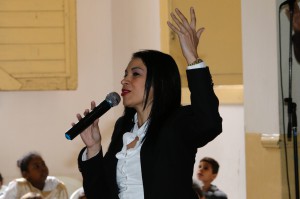
Pastor Adria Nuñez Ortiz delivering a message at Central Havana Methodist Church. Photo by Steve Beard.
approximately 46,500 members, there are about twice that number involved in the ministry of the denomination in different ways.
Although the personalities and styles of each congregation may differ, Font believes that Cuban Methodists are unified in “seeking God, the movement of the Holy Spirit, the falling of the fire and anticipating the glory of God to descend.” The primary focus of each congregation is “the love of God for the people of God. This is what we want to really see and experience and see grow,” she said.
The embers of this revival fire have been stoked since the 1970s, reports the Rev. Dr. Rini Hernandez, district superintendent in the Florida Annual Conference. Desperate times called for desperate measures. Methodists all over Cuba were participating in all night prayer vigils, reports Hernandez. The outgrowth of their prayers were miraculous signs and wonders, including speaking in tongues, physical healing, deliverance from spiritual oppression, and being physically overwhelmed by the power and presence of God in their meetings.
“We did not know it was Pentecostal,” Hernandez told Good News. “We were just asking God to fill us with the Holy Spirit.” Along with the outpouring of supernatural occurrences, these Methodists experienced a holy boldness that has characterized their singular focus on sharing their faith. “We lost all fear of repercussions and committed ourselves to share the good news of Jesus Christ with the Cuban people, one life at a time,” he recently wrote in an article for the Florida Annual Conference. “The Holy Spirit’s fire spread out to the local churches, youth camps, and almost every event in the life of the church.”
Heart-warming experience
In an interview with Bishop Ricardo Pereira in conjunction with my first visit to Cuba more than 16 years ago, he told of his special experience with the Holy Spirit on October 18, 1984, many years before he became bishop. “At that time I had two young men in my church —14 and 16 years old. They had read about John Wesley and his ‘heart-warming’ experience,” Pereira said.
“That night, at 8 o’clock they knelt down in the church and said to me, ‘Pastor we are not going to get up from here until we have the same experience that John Wesley had.’” Pereira told them that they were confused. “I don’t think it works that way. I have been told that not everyone receives the same experience.” Nevertheless, these boys were going to pursue a blessing from God. Pereira said that he grabbed one of the boys, but he said, “Pastor I will not get up from here.”
Pereira was angry. “I slammed the door and went home and started watching television,” he admits. “But something was stirring in my heart, telling me, ‘Pastor you are not doing right. How can you allow your members to pray by themselves? Why don’t you go and keep watch with them?’”
He walked back to the sanctuary and said to them, “See, you have not received anything.” The boys continued asking God to give them the power to evangelize. At 11 o’clock he told them, “It is very late. Why don’t you begin again tomorrow?”
“No pastor,” they said, “we are not going to get up from here until we receive the touch of the Spirit.” At 12:04, Pereira reports that the boys had an “explosion of light in their faces and great joy in their heart.” After their experience, Pereira said: “I was so afraid that I knelt next to them and said, ‘Okay, I won’t get up until He fills me up, too.’ I wept and asked God to forgive me. And I said, ‘Lord I want you, too. I have been preaching the gospel, doing the best I could, but if this joy is real, if you can give that explosion in the hearts of my two members, you can give it to me, too.’
“At 3:00 a.m. we were all like mad people, speaking in tongues. I woke up my wife so that I could tell her that I too had this joy in my heart.”
Renewed Methodism
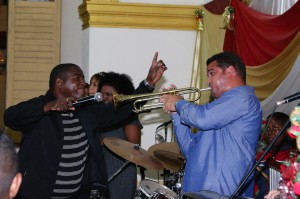
The Rev. Guillermo Leon Mighthy holds the microphone for trumpet player Jorge Lázaro Corrales Estradas. Photo by Steve Beard.
Although both share in an experiential and supernaturalist faith, Pentecostal denominations such as the Assemblies of God believe that speaking in tongues is the “initial evidence” of receiving the baptism of the Holy Spirit. That is not a doctrinal distinctive for Methodists. Nevertheless, Methodist services in Cuba are unapologetically charismatic. The framework for theology and ministry within Cuban Methodism was not imported from other denominations, but is an organic expression of their own unique divine encounter.
The Cuban experience mirrors the religious trend of its neighbors. In the latest study of 18 Latin American and Caribbean countries and one U.S. territory (Puerto Rico), Pew Research found that two-thirds of Protestants (65 percent) identified as Pentecostal Christians either through denominational affiliation or personal self-identity.
Sociologists pair Pentecostals and charismatics into the category of “renewalists” when studying international religious trends. As the fastest growing spiritual movement, renewalists account for one-fourth of all global Christians with upwards of 500 million adherents. According to the World Christian Database of the Center for the Study of Global Christianity, Brazil has the highest number of renewalists, followed by the United States, China, Nigeria, India, and the Philippines.
As Professor Philip Jenkins points out in his ground-breaking work, The Next Christendom: The Coming of Global Christianity, believers outside the United States take the Bible very seriously. “For Christians of the Southern Hemisphere, and not only for Pentecostals, the apostolic world as described in the New Testament is not just a historical account of the ancient Levant [sections of the Middle East], but an ever-present reality open to any modern believer, and that includes the whole culture of signs and wonders. Passages that seem mildly embarrassing for a Western audience read completely differently, and relevantly, in the new churches of Africa or Latin America.”
At the outset of the Cuban revolution, the late Fidel Castro used to define the boundaries of cultural engagement to the intellectuals and artists: “Inside the revolution, everything. Against the revolution, nothing.” Within revival, the Methodist Church has transfixed and transformed – redeemed, perhaps – that kind of singular focus to a pinpoint: Cuba for Christ.
High voltage worship
Even non-church going observers would recognize something combustible and dynamic taking place in a Cuban worship service. This is not the place to be if one has been lulled into expecting a predictable 55-minute morning service with two Victorian-era hymns, a children’s sermonette, a choral anthem, a homily, and tidy benediction.
“We worship God with so much passion,” said Pastor Adria Nuñez Ortiz, “we give him praise with all we have in our hearts. We have so much love for God because we understand that he has done so much for us. Everything we do for him is nothing in comparison to what he has done for us.” Nuñez is associate pastor of Central Havana Methodist Church and married to Pastor Leon. She is also a songwriter, musician, and leader of their high-energy choir.
The worship time is unmistakably Caribbean. “As in biblical times, Cuban Methodists praise the name of the Lord and dance with all kinds of instruments and shouts of joy,” Bishop Pereira told me not long ago. There is a jacked-up salsa beat with a sliver of hip-hop and drums, congas, guitars, bass, trumpets, and trombones. If you solely associate Cuban music with Buena Vista Social Club, there is a brand new galaxy of sound in the church. The worship is frenetic, physical, ecstatic, electrifying, and emotional.
With a smile, one pastor told me that the “jumping does not draw the Holy Spirit, but jumping is the response when the Holy Spirit falls.”
For Nuñez, the pogoing up and down in worship is a simple expression of joy. “We rejoice every time we think about what God has done for us,” she said. “Specifically in our context of central Havana, many people were drug addicts, idol worshippers, prostitutes and God took them out of that way and saved them. The Bible says that the one who is forgiven much, loves much. And when somebody pays a huge debt for you, then expressions of joy and happiness come out of your heart and that’s what’s happening in Cuba.”
New day in Cuba
Needless to say, many things have changed in Cuba since my first visit in 2000. Netflix is streaming (for those with credit cards); the online home rental business Airbnb is now available to foreigners, the black market emporiums are hiding in plain sight, and the Rolling Stones played last year before 500,000 in Havana in a free concert a few days after President Barack Obama’s controversial visit. With the average Cuban making less than $20 a month, there still isn’t expendable income for luxuries such as high-dollar rock concert tickets.
Cell phones are omnipresent (a vibrant black market), but the internet is spotty and frustratingly slow. Private enterprises are still in infancy stages, as one might expect in one of the last remaining Communist countries. There is, understandably, a strand of “forbidden island” allure for Americans to explore Cuba as more avenues open for tourism. Many visitors simply hit the Ernest Hemingway hot spots, buy cigars, rum, and a Che Guevara t-shirt, cruise around in a 1952 pink Cadillac convertible taxi cab, and then drink mojitos on the pristine beaches.
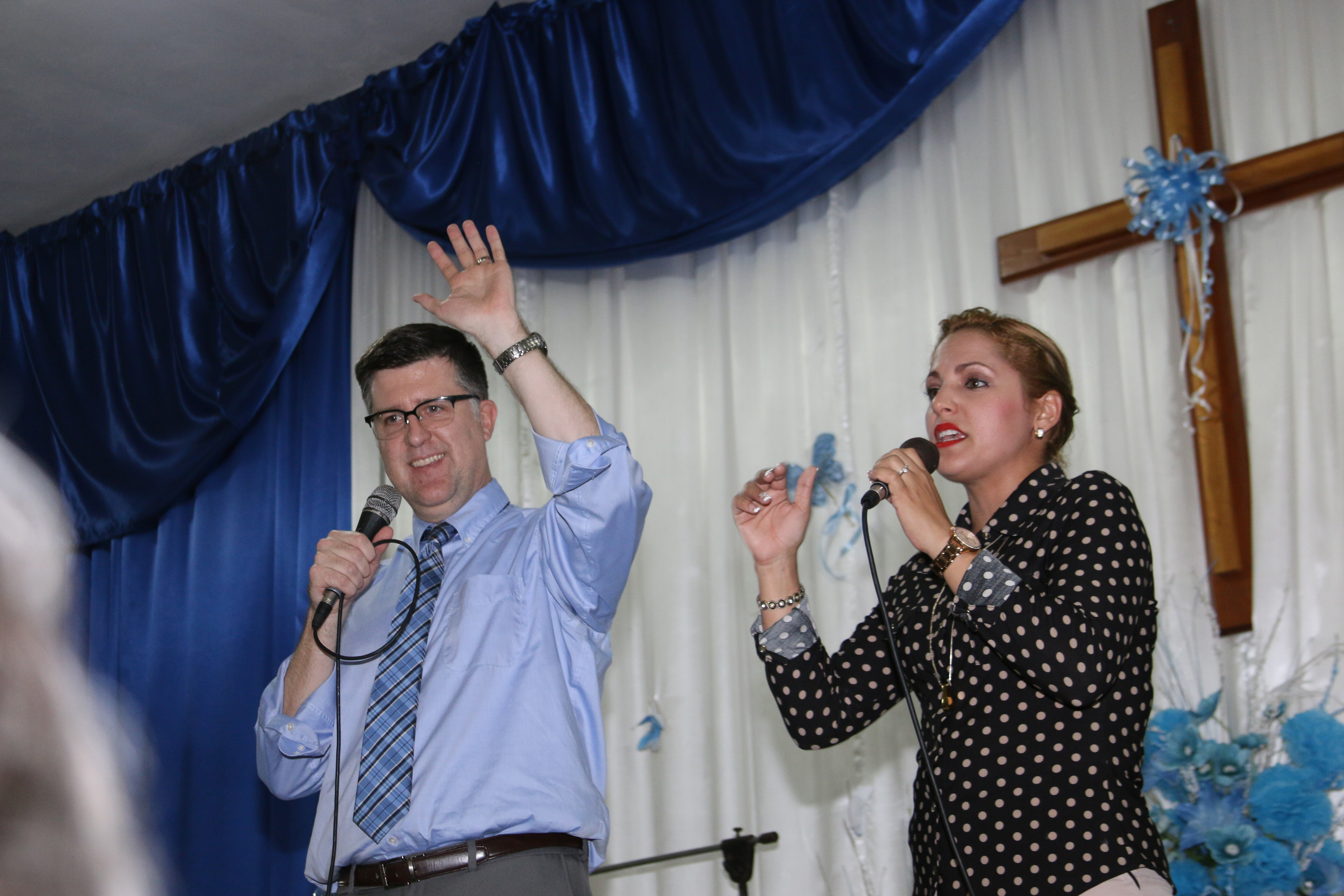
Dr. David Watson of United Theological Seminary preaches in Santiago de Las Vegas Methodist Church as Pastor Aylen Font Marrero translates the message. Photo by Steve Beard.
For Professor David Watson, however, the experience is all about plunging his students into the eye of a revivalistic tornado. “A lot of our seminary students have never experienced what spiritual renewal looks like, and when they come here they get to be a part of a very powerful Spirit-filled revival,” said Watson, the academic dean at United Theological Seminary. Watson has brought students to Cuba from the Dayton, Ohio, seminary for the last three years.
“One of the ideas behind our seminary’s emphasis on church renewal is that all renewal – individual, local church, or church universal – is the work of the Holy Spirit. That is certainly the case in the Cuban Methodist revival,” he observed. “We want our students to be exposed to and learn about what it looks like when God shows up in a powerful way in the life of a congregation or denomination.”
Amanda Moseng is one of those seminary students, soon-to-be a provisional elder in the West Ohio Annual Conference. Her trip to Cuba was sparked by a divine healing she experienced at a Holy Spirit conference hosted by United Seminary. While in Cuba, Moseng tirelessly prayed for healing and blessing for those who came forward at the end of each of the services. Not raised as a charismatic, the Cuban scenario was new, but she adapted with deftness and enthusiasm.
Moseng’s own healing encounter is the catalyst behind her faith to confidently pray for “healing in people and to open myself to let the Holy Spirit work in whatever way the Holy Spirit wants to manifest,” she said. Prior to her trip to Havana, she had never prayed for healing for someone else. She now has a “boldness of faith that only God grants, that only comes from the Spirit.” Moseng also had the unique opportunity to preach in the Central Havana church on “holy boldness” to an attentive congregation. “I’m just so humbled that God would choose me to do those things, that God would use me for that. I will be eternally grateful for what I’ve experienced here,” she said. “I’ve been transformed in ways I could never have imagined and I will leave here with a sense of boldness and faith that’s greater than I’ve ever had.”
Finding wealth in Cuba
For the last 28 years, the Rev. Jaime Nolla has made a yearly pilgrimage to Cuba. “When you see people who either walk for miles, travel on the back of a platform truck, or travel in an overloaded, very old bus, standing because of the lack of space, to get to a crowded church anticipating to experience the presence of God, your heart is moved in ways you cannot describe with words,” said Nolla, a retired United Methodist pastor and former district superintendent in the Wisconsin Annual Conference.
Nolla was one of the clergypersons standing in the front of the 500 men and women jammed into the sanctuary of the Vedado Methodist Church in downtown Havana waiting to be anointed with oil. The bustling and energetic congregation worships in a striking art deco church with loud praise music spilling out from the open doors and windows near the University of Havana. The expectancy and desire was palpable as those in seemingly never ending lines waited patiently in an attitude of prayer for this blessing.
Nolla’s numerous visits over such a lengthy period of time have afforded him opportunities to see innumerable Methodist congregations across the length of the island (more than 700 miles long).
“Many of these people come dressed with the one or two outfits they own because of the poverty on the island. However, none of the obstacles that would stop people from coming to church in the United States are big enough to stop them from coming to church,” he told Good News. “We are thankful to God for the commitment and dedication second to none that we have seen and experienced.”
“When you live in a place where there is extreme poverty, the response of the people is to find wealth in other ways,” observed the Rev. Rebekah Clapp, one of my travel mates and translators in Havana. “For Cubans, that spiritual wealth has become a response to that.” Clapp earned her M.Div. at United Theological Seminary after living in Nicaragua, and is currently working on her Ph.D. in intercultural studies at Asbury Theological Seminary.
“Because of the reality of spiritual forces that they interact with, Christians respond with language of victory, language of overcoming,” she continued. “They have victory in their lives in Christ over and against spiritual forces, over and against the powers of the idolatrous religions, over and against the work of the devil, and also over and against the socioeconomic and political reality in which they live. They can respond to it by saying, ‘I have life in Christ, I have power in the Holy Spirit, and I have victory.’ That gives them hope, that gives them purpose.”
It may also go a long way in explaining how the Methodist Church has been a sustained oasis in the spiritual desert of Cuba’s soul for the last 50 years.
Marking his 25th year, Steve Beard is the editor of Good News.
![Methodism in Cuba, Spirit-Filled and Overflowing]()
by Steve | Mar 20, 2017 | Magazine, Magazine Articles, March-April 2017
Archive: Shaping our Theological Core
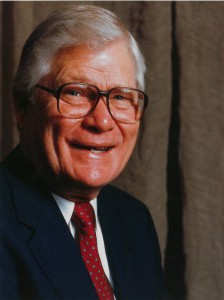
Evangelist Ed Robb preached a sermon on seminary education that sparked a controversial debate.
It was the fiery speech about seminary education given by Dr. Ed Robb Jr., an outspoken evangelist from Texas, that caught the attention and ire of Dr. Albert Outler, preeminent Wesleyan scholar at Perkins School of Theology. Through the eventual friendship of these two unique and legendary figures within United Methodism, nearly 150 Wesleyan scholars committed to the historic faith have since earned PhDs or ThDs through A Foundation for Theological Education (AFTE).
The foundation affirms the divine inspiration and ultimate authority of the Scriptures in matters of faith and practice; incarnation of Jesus Christ as fully God and fully human; necessity of conversion as a result of repentance from sin and faith in the Lord Jesus Christ; the church is of God and is the body of Christ in the world; and the sacraments of baptism and the Lord’s Supper are means of grace.
During the 1970s, Good News focused upon seminary education, launching Catalyst (now published by AFTE), funding worldwide missions, and engaging “theological pluralism” with the “Junaluska Affirmation,” an orthodox statement on Wesleyan theology. Good News requested time before the Association of Deans and Presidents of United Methodist Seminaries to present its concerns in more detail. This request was denied. However, the association did indicate receptivity to visits by seminary students, faculty, and administration.
As a result, representatives from Good News were able to have on-campus discussions with representatives of ten official United Methodist seminaries. Two seminaries turned down the request for dialogue.
As Good News celebrates 50 years of ministry within The United Methodist Church, we share the following report of Ed Robb’s speech and the creation of the Junaluska Affirmation by Dr. Riley B. Case, author of Evangelical & Methodist: A Popular History, as a testimony to the faithfulness of men and women who sacrificially prayed for and contributed to the cause of renewing United Methodism.
–Good News
By Riley B. Case
The spirit at the 1975 Good News Convocation at Lake Junaluska, North Carolina, was exhilarating, but it was intended to be more than just an evangelical family reunion. Good News was in the business of renewal, and The United Methodist Church was experiencing very little renewal. The reports were discouraging:
• In the church’s new structure, power was concentrated in the General Board of Global Ministries, which, under domination of the Women’s Division, had declared itself on behalf of liberation theology. The Commission on Social Concerns in the former Methodist structure, controlled by persons many considered social extremists, had been elevated to the status of a board, while evangelism and education had been diminished by being subsumed as divisions under the Board of Discipleship. Youth ministry was disintegrating; curriculum sales were plummeting.
• The Church’s new doctrinal statement was serving further to undermine the Church’s historic doctrinal heritage. The seminaries were still not open to evangelical presence.
• The former Evangelical United Brethren were finding that the merger was not a marriage of equals, but a corporate takeover. EUB practices and beliefs, such as freedom of conscience in matters of baptism and infant dedication, contrary to reassurances given before merger, were being scuttled by the new Church.
These discouraging developments were being reflected in dramatic reversals in membership, worship attendance, and Sunday school enrollment.
Dr. Ed Robb’s keynote address at the 1975 convocation spoke to the evangelical discontent with the seminaries. The presentation, entitled “The Crisis of Theological Education in The United Methodist Church,” linked the problems of the Church to leadership and the problem of leadership to the seminaries: “The question is, who or what is responsible for this weak leadership. I am convinced that our seminaries bear a major portion of the responsibility. If we have a sick church it is largely because we have sick seminaries.”
Among the litany of failings and shortcomings linked to the seminaries, Robb further charged: “I know of no UM seminary where the historic Wesleyan Biblical perspective is presented seriously, even as an option.”
Robb asked (1) that two seminaries be entrusted to evangelical boards of trustees and continue as United Methodist seminaries; (2) that in the spirit of inclusiveness, every United Methodist seminary invite competent evangelicals to join the faculties; and (3) that greater support be given to established evangelical seminaries, especially those in the Wesleyan-Arminian tradition.
The seminaries, and the Church’s Board of Higher Education and Ministry, if they even were aware of the Good News critique, were not inclined to treat the Robb challenge with any seriousness. No established “leaders” in the Church would ever even consider allowing evangelicals to operate a United Methodist-related seminary, and no seminary would allow such a radical shift in focus. And, these “leaders” would argue, the seminaries were already inclusive and diverse. Furthermore, there was absolutely no interest in supporting non-United Methodist schools, especially evangelical schools.
From the perspective of the institutional church and the seminaries, Good News was a reactionary throwback to a dead past. Though the convocation and Robb’s address were well reported, especially by The United Methodist Reporter, there was little denominational response to the events of the convocation – with the exception of Albert Outler, professor of Historical Theology at Perkins School of Theology. Dr. Outler did note the address and was offended by the Robb charges, especially the accusation that there was no seminary where the Wesleyan biblical perspective was treated seriously, even as an option.
Outler, too, was longing for United Methodist renewal. In many respects, Outler was “Mr. United Methodist” of the 1970s. He had chaired the Study Commission on Doctrine and Doctrinal Standards for The United Methodist Church. He had lectured bishops and represented the Church in ecumenical councils. In his lectures at the Congress on Evangelism in New Orleans in 1971, Outler recognized a growing evangelical renaissance, the sterility of liberalism, and sought to call the Church to an authentic Wesleyan theology.
In the lectures, however, Outler was not pleased with much of evangelicalism, especially with that offered by Good News: “[T]hese fine old words [‘evangelical,’ ‘evangel’] have … generated many a distorted image in many modern minds – abrasive zealots flinging their Bibles about like missiles, men (and sometimes women!) with a flat-earth theology, a monophysite Christology, a montanist ecclesiology and a psychological profile suggestive of hysteria.”
It is no wonder Outler reacted strongly to Robb’s address. In a letter to The United Methodist Reporter, Outler expressed his unhappiness: “I was … downright shocked by one of the quotations. It is sad that a well-meaning man should lodge a blanket indictment against the entire lot of United Methodist theological schools in terms so unjust that they are bound to wreck incalculable damage to the cause of theological education in the UMC – which is, as we all know, in grave enough peril already ….
“What shocked me, though, was Dr. Robb’s reported declaration: ‘I know of no United Methodist seminary where the historic Wesleyan biblical perspective is presented seriously, even as an option.’ The point, of course, is that, since Dr. Robb knows of Perkins, he has said, by strict logical entail, that the historic Wesleyan biblical perspective is not presented seriously at Perkins, ‘even as an option.’
“Now, either the phrase ‘historic Wesleyan biblical perspective’ means something that neither I nor other Wesley scholars – here and elsewhere – understand or else this accusation is simply false …. I can think of many ways in which a much needed, candid debate about Methodist theological education could have been stimulated and helped ahead; Mr. Robb’s way resembles none of them.”
Even Spurgeon Dunnam, editor of The United Methodist Reporter, was taken aback by the forcefulness of the Outler letter and contacted Robb for a response. Robb wrote a response but believed more was needed. Robb called Outler and asked if he might come to see him. Outler, according to Robb, had to think about that request for awhile before he gave grudging consent. And so it was that Ed Robb and Paul Morrell, Good News board member and pastor of Tyler Street Church in Dallas, made their call on Outler at Perkins School of Theology.
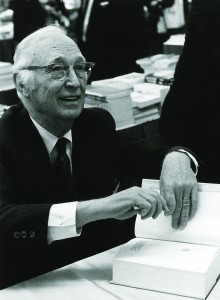
Dr. Albert Outler of Perkins School of Theology in Dallas.
Outler gave his version of the visit in an article printed in The Christian Century: “It was … downright disconcerting to have Dr. Robb and some of his friends show up in my study one day with an openhearted challenge to help them do something more constructive than cry havoc. Needless to say, I’ve always believed in the surprises of the Spirit; it’s just that they continue to surprise me whenever they occur!
“Here, obviously, was a heaven-sent opportunity not only for a reconciliation but also for a productive alliance in place of what had been an unproductive joust. Moreover, as we explored our problems, some unexpected items of agreement began to emerge.”
Thus began an unlikely friendship and alliance that would eventually lead to the establishment of A Foundation for Theological Education (AFTE). Outler’s friends in the academic world were willing to trust Robb because of Outler. Robb’s friends in the evangelical world were willing to trust Outler because of Robb.
Outler would later comment that AFTE was the most satisfying achievement of his life. In his own affirmation of Outler, Robb and the AFTE board, and not Perkins or Southern Methodist University, initiated the campaign to raise $1 million to endow the Albert Outler Chair of Wesley Studies at the seminary. The money was raised and the chair established.
Outler’s pluralism
Albert Outler, however, was not universally appreciated by Good News, primarily because of the 1972 doctrinal statement affirming “theological pluralism.” In some circles it was also known as the “Outler Statement.”
Good News had, from its inception, believed that the recovery of classical Wesleyan doctrine was the key to denominational renewal. Charles Keysor charged that the feature of “doctrinal pluralism” meant that “anybody was free to believe anything – with no negative limits.”
The great Methodist middle, however, was at best ambivalent, and in some cases downright hostile, to the suggestion that renewal in the Church was directly linked with a recommitment to historic doctrine. The arguments depreciating doctrine took several forms:
• Methodism was never a confessional church;
• Wesley had said, “If your heart is as my heart, give me your hand,” suggesting that Methodism was primarily a religion of experience;
• the way a Christian lives is more important than what a Christian believes;
• doctrine divides; and
• the emphasis on correct belief is judgmental and unloving.
A time of turmoil in politics, moral traditions, and social customs, the 1960s also brought with it a time of theological confusion: existentialism, personalism, fundamentalism, Death of God theology, process theology, and liberation theologies.
With the merger of The Evangelical United Brethren Church and The Methodist Church in 1968, the matter of stated doctrine had to be faced. Whether or not anybody believed in them – or even knew they existed – doctrinal statements had been carried in every Discipline of all the predecessor denominations from the first Methodist conference in 1784. What was now to be done with these statements, specifically the Articles of Religion of The Methodist Church and the Confession of Faith of the EUB Church?
The task was handed to a commission headed by Outler and board and agency representatives, several prominent pastors and laypersons, and a heavy preponderance of seminary professors, including outspoken liberals.
Good News, though still a fledgling movement when the commission was established, asked to participate in the discussions. There was not even a response to the letters that asked for Good News involvement. For his part, Outler was devoted to the commission and its task. He was also, perhaps more than any other person, aware of the problems the commission faced:
• Both churches, the Methodist and the EUB, had stated doctrinal standards, even though there was some discussion as to what precisely the standards were. For Methodists, the standards started with the Articles of Religion. But did they include Wesley’s sermons and his Notes Upon the New Testament?
• The doctrinal standards had been widely ignored, and even scorned, for a number of years. They were almost never referred to in Methodist seminaries.
• The scuttling of the EUB and Methodist statements, or the combining of the two, even if desirable, would probably not be possible, because of the restrictive clause in the constitution of the Methodist Discipline that stated: “The General Conference shall not revoke, alter, or change our Articles of Religion or establish any new standards or rules of doctrine contrary to our present existing and established standards of doctrine.”
The Outler solution was ingenious. Do not tamper with the restrictive clause (this would be a long, complicated, unproductive, and probably unsuccessful constitutional engagement), but write an additional statement that would interpret the doctrinal standards, placing them in historical perspective, and letting them inform the present task of theologizing even as they did not inhibit that task. Then call the Church to a new challenge to theologize and, in the process, to restate the doctrinal tradition while all the time making doctrine relevant for the present time.
The emphasis of the new statement would not be on content, that is, on the actual teachings of Methodism and Christian faith, but on process, that is, how the Church went about determining what it believed: “In this task of reappraising and applying the gospel, theological pluralism should be recognized as a principle.”
The 1972 General Conference approved the report of the Doctrinal Commission 925-17 without amendment and without discussion. No Good News voice, nor any evangelical voice for that matter, nor any voice from any perspective, even raised a question about the report or the ideas therein. After accepting the report that asserted that The United Methodist Church was not a creedal or confessional church and that pluralism was the guiding principle that would inform future doctrinal discussions, the conference moved immediately to “the social creed,” and social principles in an extended floor debate that lasted six hours. During that time, the thought that diversity or pluralism might also apply to the Church’s social stances was not expressed even once.
The Good News board was devastated by the lopsided approval of the doctrinal commission’s report and the fact that it was received so nonchalantly.
The summer 1972 issue of Good News carried a twelve-page report on General Conference written by Chuck Keysor. Five of the pages were devoted to the doctrinal statement. Quoting reports in Engage magazine and the Texas Methodist, he also argued that the statement was a revocation and alteration of the present doctrinal standards and was thus in violation of the restrictive rule in the Discipline.
Dr. Outler was scandalized by the Good News evaluation. In true Outler-style, he wrote Keysor: “Your surprisingly harsh and reckless comments on the new UMC Doctrinal Statement … have left me utterly appalled. I had not, of course, ever hoped for your positive approval, but I really had thought you might have been willing to recognize our positive efforts to make room for both conservative and liberal theological perspectives in the United Methodist Church. … There is, therefore, something tragic in your reckless and total rejection of us, since it forecloses any possibility of further meaningful dialogue. This, in turn, can only result in mutual loss, to all of us and to the church as well.”
Keysor responded in true Keysor style: “We find it ironic to hear you saying that our editorial shuts the door to dialogue. As I have already named, there was no dialogue from you until after the editorial, so it seems that publishing more editorials is the way to increase dialogue.”
Good News was not opposed to pluralism or diversity as such, but insisted that pluralism needed to operate within carefully defined limits, or an essential core of truth. Otherwise, nothing would be unacceptable as United Methodist teaching. Outler and the commission insisted that there was an essential core but never defined what it was. To Good News and others, this was like the proverbial emperor’s new clothes; one might claim to see them, but they weren’t really there.
Outside observers as diverse as Christianity Today and Time magazine understood this quite well. The Time magazine report of the General Conference noted: “The Outler commission’s solution qualifies the traditional creeds – Wesley’s Articles and the E.U.B. Confession of Faith – with explanatory statements warning that they should be interpreted within their historical context. The statements maintain that Wesley and the E.U.B. patriarchs made “doctrinal pluralism” a major tenet and held to only a basic core of Christian truth – but the statements stop short of specifying what that core was.”
With its stand clearly taken, Good News was willing to stay the battle. As Keysor editorialized in the summer issue of Good News in 1972: “What are evangelicals to do, in the aftermath of Atlanta? Many are quitting, feeling that the United Methodist Church has abandoned and betrayed Christ, the Gospel and its members.
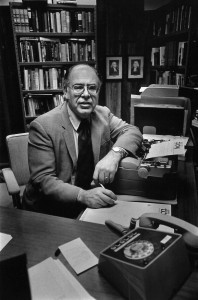
By Charles W. Keysor, Founding editor of Good News
“Good News feels deep sorrow and pain at the exodus of these brothers and sisters in Christ. We do not condemn any person for following God’s leading, but we feel strongly that God calls us to remain. This has been our motive from the start…. To separate or not to separate, that is the basic issue. And so we feel it desirable to share with readers why we believe the most important place for evangelicals is inside the United Methodist Church.”
Keysor’s reasons for staying reflected a remnant kind of thinking: “In the past (God) has worked miracles through tiny remnant groups which fear only displeasing the One who has called them – the One whom they know as Father. Who cares if we are a small minority? Numbers and success are pagan preoccupations. To gain control of the denominations means nothing; to be faithful to Jesus Christ means everything.”
Junaluska Affirmation
Chuck Keysor and Albert Outler had an intensive two-hour conversation when Outler came to Asbury Seminary in March 1974 to deliver a series of lectures on Wesleyan theology. In a detailed account of the conversation shared with a few members of the board, Keysor offered his impressions of Outler reacting to Good News concerns: Though Outler strongly believed in a core of irreducible doctrinal truth, he also believed that attempts at doctrinal definition “always result in inadequate conceptions of ultimate realities” (propositional statements demanding allegiance smacked of fundamentalism). He admitted, basically, that he was not interested in a specific of “core” essential doctrine, even though he believed the Church could refer to such a core.
Outler, however, was at least pleased that someone was willing to discuss doctrine and offered his own suggestions as to the sorts of actions Good News might pursue.
l. Good News could test the seminaries’ resistance to pluralism by underwriting the education of several outstanding young scholars who would take degrees at such institutions as Yale, Chicago, or Oxford in such areas as patristics, historical theology, and New Testament and, then backed by impeccable credentials, go to the Board of Higher Education and ask if there is any discrimination because of their conservatism (this would soon become the strategy of A Fund for Theological Education [AFTE]).
2. If the Church really wanted a descriptive statement of the “core” of essential United Methodist doctrine, it could do so by amending or altering the present statement with a 51 percent vote of the General Conference (this, in fact, would soon become the Good News legislative strategy in coming General Conferences).
3. Outler’s intent in the 1972 statement was to sketch broad theological generalities and encourage “theologizing,” in which identifiable groups in the Church would delineate their own essential core – what they would be willing to die for.
It was this third suggestion that gave additional impetus to a Good News effort, already being discussed and planned, to offer a contemporary evangelical statement of the essential core of Wesleyan doctrine for United Methodism. To do this, Good News called upon Paul Mickey, Associate Professor of Pastoral Theology at the divinity school at Duke, to lead a committee to draft a statement. Good News leaders such as Chuck Keysor, James V. Heidinger II, myself, and Lawrence Souder were joined by Dr. Dennis Kinlaw, president of Asbury College and Dr. Frank Stanger, president of Asbury Seminary, to draw up the statement.
The Junaluska Affirmation would be an evangelical response to the 1972 doctrinal statement’s invitation for groups to engage in theological discussion and affirmation, seek to identify the “core of doctrine” that the 1972 statement alluded to but never defined, and serve as a rallying point for evangelicals in the Church.
Before the final draft, the statement was shared with Albert Outler. He was obviously pleased that at least one group was taking the 1972 statement seriously enough to draw up a doctrinal statement. In response, Outler wrote: “Thanks for that copy of the ‘draft statement’ of ‘Scriptural Christianity for United Methodists.’ I’ve read it with care and real appreciation. This is an important response to that invitation … I welcome the venture, even as I have found it interesting and edifying. Power to the project – especially in its tone and temper!”
Outler continued with an eight-page critique of the statement. His critique perhaps said more about his own theology than the work of the committee. Outler argued that the approach of the statement, that is, the organizing of essential doctrines around themes of systematic theology (sin, God, atonement, Jesus Christ) was not Wesley’s approach, who rather located the “essentials” in the proclaiming of the holy story.
The statement was made available at the 1975 Good News Convocation at Lake Junaluska, where it was discussed in small groups, adopted by the assembly gathered, and became known as the Junaluska Affirmation.
The United Methodist Reporter editorialized positively on the Junaluska Affirmation and printed it in full. UMCom, the official United Methodist news service, commented briefly that the “affirmation” had been adopted and added remarks from Paul Mickey about the need for ‘theological clarity in a time of theological confusion” and from Good News referring to the doctrinal standards and the ancient creeds as the “foundation for historic faith.”
There was some disappointment on the part of Good News that the affirmation failed to stir up either reaction or critique or comment from the larger Church. It was pointed out, however, that except for the bishops – given the charge in the Discipline “to guard … the apostolic faith” – no board or agency or group in the Church felt ownership or responsibility for doctrine. It was not so much that the general Church agreed or disagreed or affirmed or denied the Good News doctrinal effort. It was rather that it just did not care that much.
Later, the September 1975 issue of Interpreter magazine carried an editorial by Roger Burgess entitled “Has Good News Become Bad News?” Burgess did not critique the Junaluska Affirmation but was uneasy that Good News should draw up a statement in the first place. He concluded: “I find it hard to discover much that is constructive or loyal in these actions and proposals.”
As far as Good News was concerned, the Burgess comments were a misreading of the intent of the Junaluska Affirmation and of the purpose of Good News. But for once, Good News was secure enough it did not need to be defensive about the accusations of the editorial. It would direct its energies from this time forth not needing to define who it was, but in understanding and seeking to bring renewal to The United Methodist Church.
And the task, at least as it related to doctrine, was formidable. The general Church, already in a state of doctrinal confusion, seemed to be able to make no sense out of the 1972 statement. The attempts to clarify seemed only further to obfuscate. In 1976, the General Board of Discipleship published the pamphlet “Essential Beliefs for United Methodists.” It was to be an attempt to interpret to local churches and individuals the 1972 doctrinal statement.
The pamphlet managed to feature “essential beliefs” without the first mention of doctrinal standards or of the Articles of Religion or the Confession of Faith or of the sermons of Wesley. The one belief that seemed more essential than all others was the belief that “our strength comes through unity in diversity rather than through rigid uniformity.”
If there were “essential beliefs,” they were what we were to formulate for ourselves (the opening sentence was, “Our beliefs grow out of our experiences”), based on the quadrilateral: Scripture, Tradition, Experience, and Reason. These core beliefs evidently had nothing to do with Christ’s death on the cross for our sin or, for that matter, Christ’s death on the cross for any reason. Nor did it refer to the Resurrection, to salvation, justification, sanctification, heaven or hell, or to the New Birth. At least none of these were even mentioned.
The pamphlet was obsessed with the importance of the quadrilateral, and that discussion took twelve of the sixteen pages. It spent time with sacraments and mentioned creeds, but only with the discounting qualification that “the living God cannot be reduced to or contained in any creed.”
But, according to the pamphlet, the Church was not without stated beliefs. United Methodists did have agreement, if not about doctrinal beliefs, then on the social principles. “Essential Beliefs for United Methodists” closed with the Social Creed prefaced with the words: “Our Social Creed provides a summary of our beliefs as United Methodists.”
Good News had a long and laborious task ahead of it.
Riley B. Case is the author of Evangelical & Methodist: A Popular History (Abingdon). He is a retired United Methodist clergy person from the Indiana Annual Conference, the associate director of the Confessing Movement, and a lifetime member of the Good News Board of Directors. This essay is adapted with permission from Evangelical & Methodist.
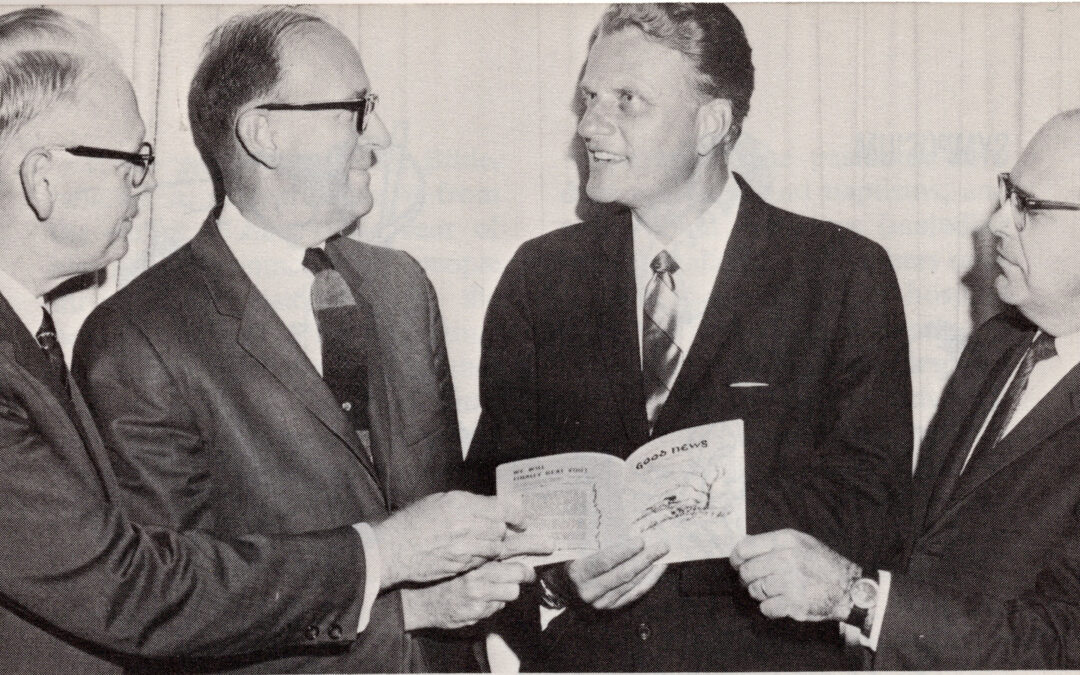
by Steve | Mar 20, 2017 | Magazine, Magazine Articles, March-April 2017
HISTORY ARCHIVE: The Junaluska Affirmation
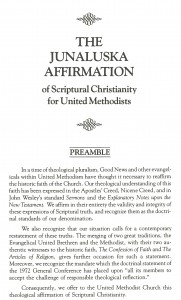 On July 20, 1975, the statement, “An Affirmation of Scriptural Christianity for United Methodists” was adopted by the Board of Directors of Good News during the 1975 Convocation of United Methodists for Evangelical Christianity meeting at Lake Junaluska, North Carolina; hence, the title, “The Junaluska Affirmation.”
On July 20, 1975, the statement, “An Affirmation of Scriptural Christianity for United Methodists” was adopted by the Board of Directors of Good News during the 1975 Convocation of United Methodists for Evangelical Christianity meeting at Lake Junaluska, North Carolina; hence, the title, “The Junaluska Affirmation.”
Preamble: In a time of theological pluralism, Good News and other evangelicals within United Methodism have thought it necessary to reaffirm the historic faith of the Church. Our theological understanding of this faith has been expressed in the Apostles’ Creed, Nicene Creed, and in John Wesley’s standard Sermons and the Explanatory Notes upon the New Testament. We affirm in their entirety the validity and integrity of these expressions of Scriptural truth, and recognize them as the doctrinal standards of our denomination.
We also recognize that our situation calls for a contemporary restatement of these truths. The merging of two great traditions, the Evangelical United Brethren and the Methodist, with their two authentic witnesses to the historic faith, The Confession of Faith and The Articles of Religion, gives further occasion for such a statement. Moreover, we recognize the mandate which the doctrinal statement of the 1972 General Conference has placed upon “all its members to accept the challenge of responsible theological reflection.”
Consequently, we offer to the United Methodist Church this theological affirmation of Scriptural Christianity.
The Holy Trinity: Scriptural Christianity affirms the existence of the one Eternal God who has revealed Himself as Father, Son and Holy Spirit, three equal but distinct Persons, mysteriously united in the Godhead which the Church historically has described as the Holy Trinity.
God the Father: Scriptural Christianity affirms that the first Person of the Holy Trinity, God the Father, is the Eternal One and reigns supremely. He has provided a covenant through which His creatures can be redeemed and through which His creation will be liberated from all evil and brought to final righteousness at the end of the age.
God the Son: Scriptural Christianity affirms that the second Person of the Holy Trinity, the Eternal Son, became incarnate as Mary’s virgin∕born Child, Jesus of Nazareth, the Christ. In His unique Person, He revealed to us both the fullness of deity and the fullness of humanity. By His life, suffering, death, resurrection and ascension He provided the only way of salvation. His sacrifice on the cross once and for all was to reconcile the Holy God and sinners, thus providing the only way of access to the Father. Now He intercedes as High Priest before the Father, awaiting the day when He will return to judge every person, living and dead, and to consummate His Kingdom.
God the Holy Spirit: Scriptural Christianity affirms that the third Person of the Holy Trinity, the Holy Spirit, was active from the beginning in creation, revelation and redemption. It was through His anointing that prophets received the Word of God, priests became intermediaries between God and His people, and kings were given ruling authority. The Spirit’s presence and power, measured in the Old Testament, were found without measure in Jesus of Nazareth, the Anointed. The Spirit convicts and woos the lost, gives new birth to the penitent, and abides in the believer, perfecting holiness and empowering the Church to carry out Christ’s mission in the world. He came to indwell His Church at Pentecost, enabling believers to yield fruit and endowing them with spiritual gifts according to His will. He bears witness to Christ and guides God’s people into His truth. He inspired the Holy Scriptures, God’s written Word, and continues to illuminate His people concerning His will and truth. His guidance is always in harmony with Christ and the truth as given in the Holy Scriptures.
Humanity: Scriptural Christianity affirms that man and woman are fashioned in the image of God and are different from all of God’s other creatures. God intends that we should glorify Him and enjoy Him forever. Since the Fall of Adam the corruption of sin has pervaded every person and extended into social relationships, societal systems, and all creation. This corruption is so pervasive that we are not capable of positive responses to God’s offer of Redemption, except by the prevenient, or preparing, grace of God. Only through the justifying, regenerating and sanctifying work of the Triune God can we be saved from the corruption of sin, become increasingly conformed to the image of Christ, and restored to the relationships which God has intended for us.
The Holy Scriptures: Scriptural Christianity affirm as the only written Word of God the Old and New Testaments. These Holy Scriptures contain all that is necessary for our knowledge of God’s holy and sovereign will, of Jesus Christ the only Redeemer, of our salvation, and of our growth in grace. They are to be received through the Holy Spirit as the guide and final authority for the faith and conduct of individuals and the doctrines and life of the church. Whatever is not clearly revealed in, or plainly established as truth by, the Holy Scriptures cannot be required as an article of faith nor be taught as essential to salvation. Anything contrary to the teachings of the Holy Scriptures is contrary to the purposes of God and must, therefore, be opposed. The authority of Scripture derives from the fact that God, through His Spirit, inspired the authors, causing them to perceive God’s truth and record it with accuracy. It is evident that the Holy Scriptures have been preserved during the long process of transmission through copyists and translators, and we attribute such accurate preservation to the work of the Holy Spirit. These Scriptures are supremely authoritative for the Church’s teaching, preaching, witness, identifying error, collecting the erring, and training believers for ministry in and through the Church.
Salvation: Scriptural Christianity affirms that God offers salvation to a sinful humanity and a lost world through Jesus Christ. By His death on the cross the sinless Son propitiated the holy wrath of the Father, a righteous anger occasioned by sin. By His resurrection from the dead, the glorified Son raises us to newness of life. When we appropriate by faith God’s atoning work in Jesus Christ we are forgiven, justified, regenerated by His Holy Spirit, and adopted into the family of God. By His grace He sanctifies His children, purifying their hearts by faith, renewing them in the image of God, and enabling them to love God and neighbor with whole heart. The fullness of God’s great salvation will come with the return of Christ. This cosmic event will signal the resurrection of the saved to eternal life and the lost to eternal damnation, the liberation of creation from the Adamic curse, God’s final victory over every power and dominion, and the establishment of the new heaven and the new earth.
The Church: Scriptural Christianity affirms that the Church of Jesus Christ is the community of all true believers under His sovereign Lordship. This Church, the Body of Christ, is one because it shares one Lord, one faith, one baptism. It is holy because it belongs to God and is set apart for His purposes in the world. It is apostolic because it partakes of the authority granted to the apostles by Christ Himself. It is universal because it includes all believers, both living and dead, in every nation, regardless of denominational affiliation. Its authenticity is to be found wherever the pure Word of God is preached and taught; wherever the Sacrament of Baptism and Holy Communion are celebrated in obedience to Christ’s command; wherever the gifts of the Holy Spirit upbuild the body and bring spiritual growth; wherever the Spirit of God creates a loving, caring fellowship, and a faithfulness in witness and service to the world; and wherever discipline is administered with love under the guidance of the Word of God. The Church, as the Bride of Christ, will ultimately be joined with her Lord in triumphant glory.
Ethics: Scriptural Christianity affirms that we are God’s workmanship, created in Christ Jesus for good works. These works are the loving expressions of gratitude by the believer for the new life received in Christ. They do not earn one’s salvation nor are they a substitute for God’s work of redemption. Rather, they are the result of regeneration and are manifest in the believer as evidence of a living faith.
God has called us to do justice, to love kindness, and to walk humbly with Him. In the Scriptures are found the standards and principles that guide the believer in this walk. These ethical imperatives, willingly accepted by the believer, enable us to be a part of God’s purposes in the world. Moreover, in this we are called to an obedience that does not stop short of our willingness to suffer for righteousness’ sake, even unto death.
Our life in Christ includes an unstinting devotion to deeds of kindness and mercy and a wholehearted participation in collective efforts to alleviate need and suffering. The believer will work for honesty, justice and equity in human affairs; all of which witness to inherent rights and a basic dignity common to all persons created in the image of God. Such contemporary issues as racism, housing, welfare, education, Marxism, Capitalism, hunger, crime, sexism, family relationships, aging, sexuality, drugs and alcohol, abortion, leisure, pornography, and related issues call for prayerful consideration, thoughtful analysis, and appropriate action from Christians, and must always be a matter of concern to the Church. Thus, we remember that faith without works is dead.
Postscript: In April, 1974 the Good News Board of Directors appointed a Theology and Doctrine Task Force to prepare an affirmative statement of Scriptural Christianity for Good News.
The task force was chaired by the Rev. Dr. Paul A. Mickey, Assistant Professor of Pastoral Theology, Divinity School, Duke University, Durham, North Carolina. Additional task force members included: the Rev. Riley Case, Pastor, Wesley UM Church, Union City, Indiana; the Rev. Dr. James V. Heidinger, Pastor, The UM Church, Cadiz, Ohio; the Rev. Dr. Charles V. Keysor, Editor, Good News, Wilmore, Kentucky; the Rev. Dr. Dennis F. Kinlaw, President, Asbury College, Wilmore, Kentucky; Mr. Lawrence Souder, layman, Centerville, Ohio; the Rev. Dr. Frank B. Stanger, President, Asbury Theological Seminary, Wilmore, Kentucky; and initially, the Rev. Bob Stamps, Chaplain, Oral Roberts University, Tulsa, Oklahoma.
© 1975 Forum for Scriptural Christianity Within The United Methodist Church (Good News).















